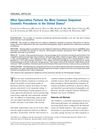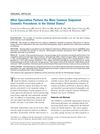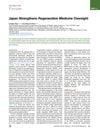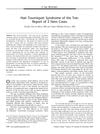 33 citations,
February 2019 in “Journal of Tissue Engineering and Regenerative Medicine”
33 citations,
February 2019 in “Journal of Tissue Engineering and Regenerative Medicine” Platelet-Rich Plasma (PRP) shows promise for treating various skin conditions, but more research is needed to standardize its use.
 32 citations,
January 2010 in “Dermatology”
32 citations,
January 2010 in “Dermatology” Combining laser hair removal with topical eflornithine is recommended for better results in treating unwanted facial hair.
[object Object]  30 citations,
March 2015 in “Clinical Endocrinology”
30 citations,
March 2015 in “Clinical Endocrinology” Young women with high male hormone levels or PCOS often feel more psychological distress and have a lower quality of life.
 30 citations,
January 2008 in “Dermatologic Surgery”
30 citations,
January 2008 in “Dermatologic Surgery” Dermatologists perform most outpatient cosmetic procedures in the U.S., especially on white women aged 40 to 59.
 29 citations,
March 2008 in “Postcolonial Studies”
29 citations,
March 2008 in “Postcolonial Studies” The article concludes that the global hair trade is exploitative and reflects complex cultural and economic issues.
 27 citations,
March 2013 in “Social Semiotics”
27 citations,
March 2013 in “Social Semiotics” Commercial hair loss websites promote Propecia by making men feel insecure about baldness and suggesting it's a medical issue needing treatment.
 25 citations,
December 2015 in “Journal of the European Academy of Dermatology and Venereology”
25 citations,
December 2015 in “Journal of the European Academy of Dermatology and Venereology” Alopecia areata significantly lowers quality of life, especially in personal and social areas, and more so if the patient is also depressed.
 24 citations,
July 2016 in “Revue Neurologique”
24 citations,
July 2016 in “Revue Neurologique” Gilles de la Tourette syndrome is treatable, with behavioral therapy as a recommended first option and other treatments available for more severe cases.
 22 citations,
May 2011 in “American Journal of Clinical Dermatology”
22 citations,
May 2011 in “American Journal of Clinical Dermatology” Recognizing and managing skin-related psychiatric disorders in children is crucial for effective treatment.
[object Object]  22 citations,
December 2007 in “Dermatologic Surgery”
22 citations,
December 2007 in “Dermatologic Surgery” Dermatologists performed the most outpatient cosmetic procedures in the U.S. from 1995 to 2003, especially on white women aged 40 to 59.
 21 citations,
September 2016 in “Journal of Dermatological Treatment”
21 citations,
September 2016 in “Journal of Dermatological Treatment” The new classification system for skin disorders emphasizes the importance of understanding a patient's awareness of their condition for better treatment.
 21 citations,
March 2006 in “Seminars in Cutaneous Medicine and Surgery”
21 citations,
March 2006 in “Seminars in Cutaneous Medicine and Surgery” Most hair loss disorders can be accurately diagnosed and treated in an outpatient setting.
 21 citations,
January 1988 in “Stress Medicine”
21 citations,
January 1988 in “Stress Medicine” Stress affects skin health and emotional well-being should be considered in skin disease treatment.
 20 citations,
August 2018 in “Clinics in Dermatology”
20 citations,
August 2018 in “Clinics in Dermatology” The conclusion is that understanding and addressing the psychological effects of alopecia areata is important for effective treatment.
 19 citations,
July 2020 in “Journal of cancer survivorship”
19 citations,
July 2020 in “Journal of cancer survivorship” People undergoing chemotherapy need better support and information to cope with hair loss.
 19 citations,
February 2018 in “Cell Stem Cell”
19 citations,
February 2018 in “Cell Stem Cell” Japan improved its regulation of regenerative medicine to ensure safety and prevent unproven treatments.
 19 citations,
January 2007 in “Dermatology”
19 citations,
January 2007 in “Dermatology” Unwanted facial hair significantly impacts over 40% of women's psychological and social well-being, and various treatment options are available.
 18 citations,
December 2016 in “Phytomedicine”
18 citations,
December 2016 in “Phytomedicine” Curcuma aeruginosa essential oil effectively reduces hair growth and lightens underarm skin.
 18 citations,
June 2010 in “Current medicinal chemistry”
18 citations,
June 2010 in “Current medicinal chemistry” Treating hirsutism in women often requires a mix of medications and cosmetic methods for best results.
 17 citations,
December 2020 in “Journal of Genetic Counseling”
17 citations,
December 2020 in “Journal of Genetic Counseling” Genetic counselors should be culturally skilled and aware of transgender patients' unique health risks and needs.
 17 citations,
February 2020 in “Journal of Pediatric and Adolescent Gynecology”
17 citations,
February 2020 in “Journal of Pediatric and Adolescent Gynecology” Early medical support for transgender youth is important for their health, with low regret for gender-affirming hormone use and a need for knowledgeable care providers.
 17 citations,
December 2009 in “Journal of Pediatric Orthopaedics”
17 citations,
December 2009 in “Journal of Pediatric Orthopaedics” Two babies needed surgery to remove hair tightly wrapped around their toes to prevent serious injury.
 16 citations,
January 2019 in “Neuropsychobiology”
16 citations,
January 2019 in “Neuropsychobiology” People with Lichen Planopilaris tend to be more depressed, have lower self-esteem, and a worse quality of life.
 16 citations,
December 2007 in “Expert Review of Pharmacoeconomics & Outcomes Research”
16 citations,
December 2007 in “Expert Review of Pharmacoeconomics & Outcomes Research” PCOS lowers quality of life, causing issues like obesity, infertility, and menstrual problems.
 15 citations,
August 2022 in “Journal of endocrinological investigation”
15 citations,
August 2022 in “Journal of endocrinological investigation” Vitamin D and calcium are important for quick and effective skin wound healing.
 15 citations,
June 2014 in “Integrative cancer therapies”
15 citations,
June 2014 in “Integrative cancer therapies” Pranic meditation significantly improved mental health and quality of life for breast cancer survivors.
 15 citations,
March 2014 in “Body Image”
15 citations,
March 2014 in “Body Image” Wig users with alopecia do a lot of emotional and practical work to make their wigs look natural and manage how others see them.
 15 citations,
January 2014 in “Anais Brasileiros de Dermatologia”
15 citations,
January 2014 in “Anais Brasileiros de Dermatologia” Lupus treatment requires a combination of drugs and therapies, with research needed for new options.
 14 citations,
January 2013 in “International Journal of Trichology”
14 citations,
January 2013 in “International Journal of Trichology” Treating hair loss requires a comprehensive approach that addresses both physical and emotional aspects, with a focus on diagnosis, patient education, and good communication.
 14 citations,
March 2010 in “Gynecological endocrinology”
14 citations,
March 2010 in “Gynecological endocrinology” New treatments for excessive hair growth in women include insulin modulators and enzyme inhibitors.






























